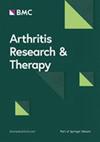数字健康应用程序ViViRA对脊椎关节炎患者脊柱活动度、身体功能、生活质量和疼痛感知的影响:一项随机对照试验
IF 4.9
2区 医学
Q1 Medicine
引用次数: 0
摘要
脊椎关节炎(spa)是一组常见的风湿病,通常导致活动受限和下背部疼痛。物理治疗是治疗的一个组成部分,但获得物理治疗限制了治疗的成功。数字健康应用程序(DHAs)使家庭理疗成为可能,并可显著改善水疗患者获得理疗的机会。目的是研究DHA ViViRA与标准物理治疗的临床效果。患有慢性背痛的spa患者被纳入了一项随机对照试验。干预组给予ViViRA DHA治疗,对照组给予标准物理治疗。疼痛(言语评定量表,Pain - detect)、生活质量(SF-36)和活动能力(BASMI)在基线和12周后作为主要结果进行评估。分析了59名参与者(71.2%为女性,平均年龄45.2岁)的数据。干预组活动能力显著改善(BASMI平均评分:基线:1.1[范围0.7-1.5];随访:1.0[范围0.5-1.4];P = 0.05),而对照组的活动能力显著下降(基线:1.5[范围1.1-1.9];随访:1.8[范围1.4-2.2];p = 0.00)。12周后,干预组疼痛强度(VRS疼痛水平为3.5±2.8周)低于对照组(VRS疼痛水平为4.5±2周)。我们的结果强调了dha如ViViRA治疗spa患者腰痛的疗效。与目前的金标准相比,物理疗法、DHA的使用效果更好。然而,需要进一步更大规模的研究来证实这些有希望的结果。该研究已在德国临床试验注册中心(DRKS)注册,ID: DRKS00031254。本文章由计算机程序翻译,如有差异,请以英文原文为准。
Impact of the digital health application ViViRA on spinal mobility, physical function, quality of life and pain perception in spondyloarthritides patients: a randomized controlled trial
Spondyloarthritides (SpAs) are a group of common rheumatic diseases that often cause limited mobility and lower back pain. Physiotherapy is an integral part of treatment, but access to physiotherapy limits treatment success. Digital health applications (DHAs) enable home-based physiotherapy and could significantly improve access for SpAs patients. The aim is to investigate the clinical effects of the DHA ViViRA compared with those of standard physiotherapy. SpAs patients with chronic back pain were enrolled in a randomized controlled trial. The intervention group received ViViRA DHA, whereas the control group received standard physiotherapy. Pain (verbal rating scale, PAIN-Detect), quality of life (SF-36) and mobility (BASMI) were assessed at baseline and after 12 weeks as the primary outcomes. Data from 59 participants (71.2% female, mean age 45.2 years) were analyzed. The intervention group showed a significant improvement in mobility (average BASMI score: baseline: 1.1 [range 0.7–1.5]; follow-up: 1.0 [range 0.5–1.4]; p = 0.05), whereas the control group showed a significant decrease in mobility (baseline: 1.5 [range 1.1–1.9]; follow-up: 1.8 [range 1.4–2.2]; p = 0.00). The intervention group demonstrated lower pain intensity (VRS pain level at week 3.5 ± 2.8) than did the control group (VRS pain level at week 4.5 ± 2) after 12 weeks. Our results highlight the efficacy of DHAs such as ViViRA in the treatment of lower back pain in SpAs patients. Compared with the current gold standard, physiotherapy, DHA use results in superior outcomes. However, further larger studies are needed to confirm these promising results. The study is registered in the German clinical trial registry (DRKS) under the following ID: DRKS00031254.
求助全文
通过发布文献求助,成功后即可免费获取论文全文。
去求助
来源期刊

Arthritis Research & Therapy
RHEUMATOLOGY-
CiteScore
8.60
自引率
2.00%
发文量
261
审稿时长
14 weeks
期刊介绍:
Established in 1999, Arthritis Research and Therapy is an international, open access, peer-reviewed journal, publishing original articles in the area of musculoskeletal research and therapy as well as, reviews, commentaries and reports. A major focus of the journal is on the immunologic processes leading to inflammation, damage and repair as they relate to autoimmune rheumatic and musculoskeletal conditions, and which inform the translation of this knowledge into advances in clinical care. Original basic, translational and clinical research is considered for publication along with results of early and late phase therapeutic trials, especially as they pertain to the underpinning science that informs clinical observations in interventional studies.
 求助内容:
求助内容: 应助结果提醒方式:
应助结果提醒方式:


